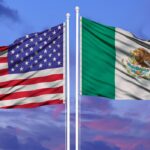China's Zero Covid policy to renew U.S. West Coast port congestion, expert warns

The severe congestion seen at U.S. West Coast ports this past winter will likely return once due to China's Zero Covid policy, an expert has warned.
Dr. Sara Hsu, an expert in Chinese fintech and economic development, wrote in the publication The Diplomat that once the strict lockdown in Shanghai is lifted, the backlog of goods waiting to enter ports on the other side of the Pacific Ocean will renew.
The lockdown and Zero Covid policy have massively slowed down Shanghai port’s container unloading as well as domestic production for exports.
"Once the lockdown is lifted and economic activity once again springs to life, a pileup of products from accumulated orders will surge into the United States," Hsu wrote.
Hundreds of container ships and bulk ships are waiting to unload off the port of Shanghai, while air carriers have announced numerous cancellations, she said.
Trucking activity in China has slowed, as truckers face the possibility of quarantine or being blocked off on the road. Truckers and workers have also been subjected to mass Covid-19 testing.
Now, there are not enough truckers to bring finished goods to ports or to bring raw materials to factories, she said.
However, she expects a surge in imports into the U.S. from China to take place in June or July once the stringent measures are lifted, creating congestion once again for Southern California ports, which last experienced peak congestion in January.
"Long Beach and the Port of Los Angeles import about 40 percent of all containerized goods into the U.S. The surge is likely to overwhelm West Coast ports, which have finally returned to normal throughput," she said.
This surge in port activity will also likely further exacerbate the ongoing shortages in trucking capacity.
"In order to prevent this disruption from interrupting their supply chains, some firms are looking to move supply chains out of China," she said.
"FreightWaves has noted a large increase in freight modeling requests for companies that are looking to relocate production. Alternative sourcing locations in Asia include Vietnam and Malaysia. In the short term at least, many U.S. importers will simply have to endure yet another disruption in global supply chains."














































